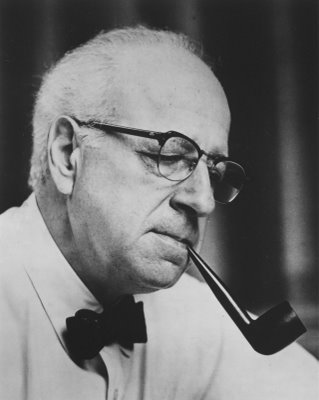Piston’s music fares best in Chicago Ensemble’s mixed season closer
The mutable Chicago Ensemble closed its season Tuesday night with a typically generous and eclectic program of wind music at Fourth Presbyterian Church.
With five different works on the menu, the performances suffered from even more rough edges than usual and an overall lack of refinement. While its ambitious, wide-roving programs are one of The Chicago Ensemble’s charms, perhaps fewer works and more concentrated rehearsal time would make for more polished results.
That said, props to the group’s pianist and artistic director Gerald Rizzer for programming music of Walter Piston, one of our most inexplicably neglected composers.
Better known in his lifetime as a teacher and author of college musical texts, Piston has been scandalously ignored since his death in 1976. That’s unfortunate, since his music is attractive and distinctive with a lean, Neo-Classical drive, rhythmic bite and edgy impetus that are consistently beguiling.
Piston’s early Three Pieces for flute, clarinet and bassoon date from 1926, and finds the composer still somewhat under the French influence of his teacher Nadia Boulanger. Even so, Piston’s individuality is palpable in the wry astringency of the opening Allegro scherzando and the syncopated dance-hall snap of the closing moto perpetuo. The central Lento is especially characteristic, with Piston’s brand of rugged unemotional introspection.
Considering some of the fallible execution in other works Tuesday night, the Piston provided the surprising high point of the evening, with flutist Susan Levitin, clarinetist Elizandro Garcia-Montoya and bassoonist Jill Dispenza providing a bracing performance that brought out the wit and quirky rhythmic ingenuity.
From the same era is Poulenc’s Sextet, which breathes a more populist side of contemporary Paris in its rollicking Boulevardier esprit, with fleeting pre-echoes of the more inward, spiritual Poulenc to come. Levinitin, Garcia-Montoya and Dispenza were joined by oboist Ricardo Castaneda, hornist Neil Kimel and Rizzer for a lively if raucous performance that could have used more hushed and tender playing in the Andantino and more polished and smoothly blended textures overall.
Kimel, with Rizzer, also contributed a graceful rendering of Richard Strauss’s brief Andante for horn, written for the composer’s father.
The first half—as is often the case with this group—was less consistent. It was good to hear some music of the prolific but still overlooked Telemann yet his melodic “Parisian Quartet” in A major made for rather bland results with blowsy wind playing and a lack of contrast in the ironed-out moderate tempos.
Mozart’s Piano and Wind Quintet, K. 452, fared somewhat better with the playful wit and inexhaustible thematic richness and working out well conveyed in the outer movements.
The rapt Larghetto was less successful, taken at an impatient tempo with wind playing far too coarse and loud, unaided by what sounded like someone noisily emptying trash containers behind the chapel wall.
Posted in Uncategorized




